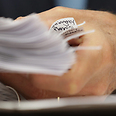
Leaked UN report: Assad behind chemical attack
UN report on infamous Damascus chemical attack to be published Monday. Information leaked by UN diplomatic to Foreign Policy says 'rich' sample collected, indirectly implicating Assad as responsible for the attack
The UN inspectors left Syria on August 31 after collecting samples as part of their probe into the now infamous August 21 chemical weapons attack in a suburb of the Syrian capital. According to a story published by Foreign Policy Magazine on Thursday, the inspectors have found a "wealth" of circumstantial evidence on the use of chemical agents by Syrian President Bashar Assad.
Related stories:
- Putin 'alarmed' by US policy of military intervention
- Report: Russia offers four step plan for Syria arms handover
- Report: Israel manufactured chemical weapons
Regarding the expected report, Fabius hinted it would confirm much of what the West already knows. "It will say that there was a chemical massacre... There will certainly be indications" of the origins of the attack, he told French radio Thursday, adding that "Only the regime had the (chemical weapons) stocks, the (firing) vectors and the interest in doing it, so we can draw a conclusion from that."
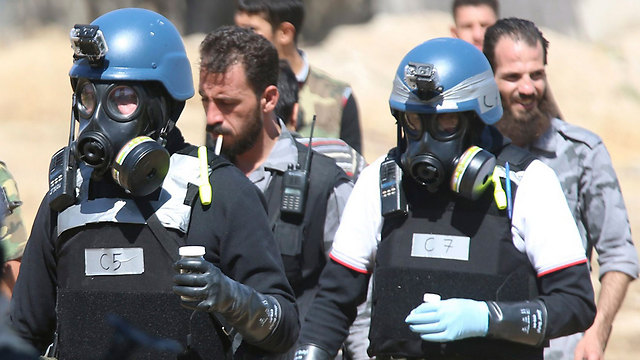
UN investigation team in Syria (Photo: Reuters)
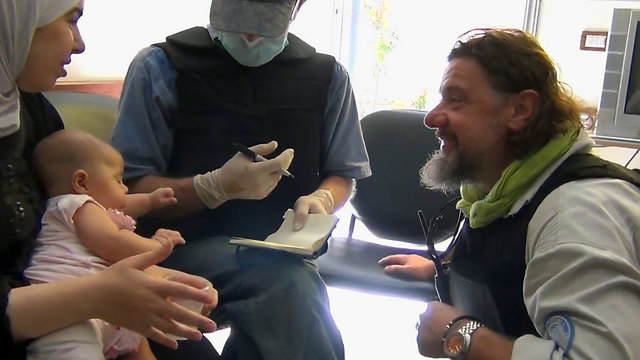
UN team examines Syrian baby (Photo: Reuters)
The report will not directly blame Assad's regime for the chemical attack, three UN-based diplomats told the Foreign Policy. However, it will present strong circumstantial evidence that indirectly implicates the government's responsibility based on the examination of used rocket casings and ammunition as well as laboratory tests of soil, blood, and urine samples taken by the UN team.
"I know they have gotten very rich samples and … have interviewed victims, doctors and nurses," an official said. "It seems they are very happy with the wealth of evidence they got… You can conclude from the type of evidence (its) author."
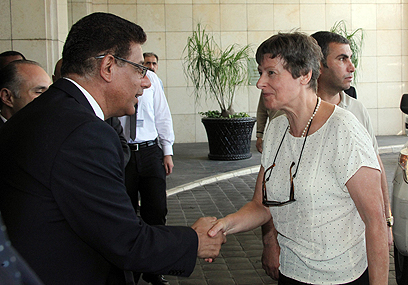
UN disarmament chief Angela Kane in Syria (Photo: EPA)
Despite the insinuated certainty of the report's findings, in an interview with CBS's Charlie Rose, Bashar Assad contended that "there has been no evidence that I used chemical weapons against my own people."
A claim echoed by his ally, Russia, which not only rejected the alleged culpability of the Assad regime but also claimed that there is evidence to the contrary, which points to chemical weapons use by rebels.
In an op-ed published Thursday in the New York Times, Russian President Valdim Putin said that "No one doubts that poison gas was used in Syria. But there is every reason to believe it was used not by the Syrian Army, but by opposition forces to provoke intervention by their powerful foreign patrons.
"Reports that militants are preparing another attack – this time against Israel – cannot be ignored," he dramatically concluded.
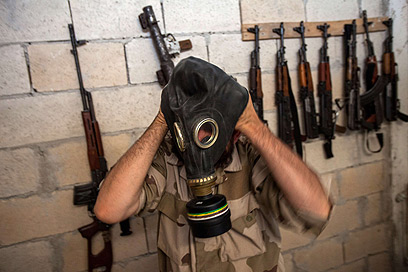
Rebel trying on gas mask (Photo: AFP)
Despite the report's pending publication, UN Secretary-General Ban said Monday that he is "considering urging the Security Council to demand the immediate transfer of Syria's chemical weapons and chemical precursor stocks to places inside Syria where they can be safely stored and destroyed."
Syria has admitted to operating clandestine chemical weapon facilities and expressed readiness to halt their operation: "We are ready to reveal the locations of the chemical weapon sites and to stop producing chemical weapons and make these sites available for inspection by representatives of Russia, other countries and the United Nations," Syrian Foreign Minister Walid al-Moallem said in a statement.
Meanwhile, UN Security Council envoys from Britain, China, France, Russia and the United States held talks on Wednesday on the Syrian chemical weapons crisis, but no agreement was reached. "They discussed elements that could go into a resolution" on Syria, said one UN diplomat, referring to the 45-minute meeting between the council's veto-wielding permanent members.
AFP, Reuters and the Associated Press contributed to this report
- Receive Ynetnews updates directly to your desktop










